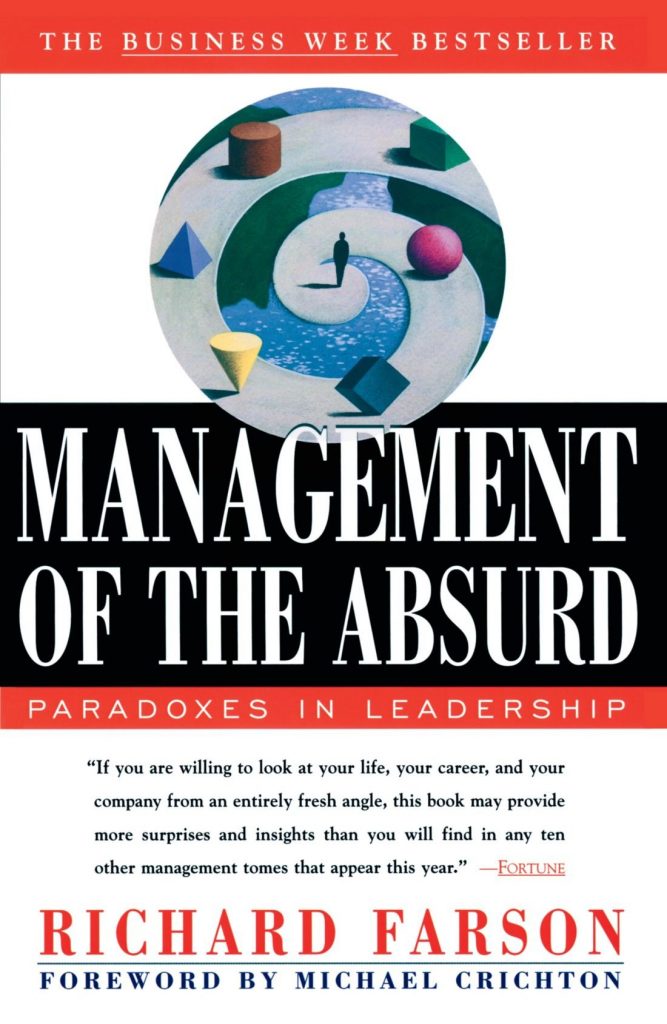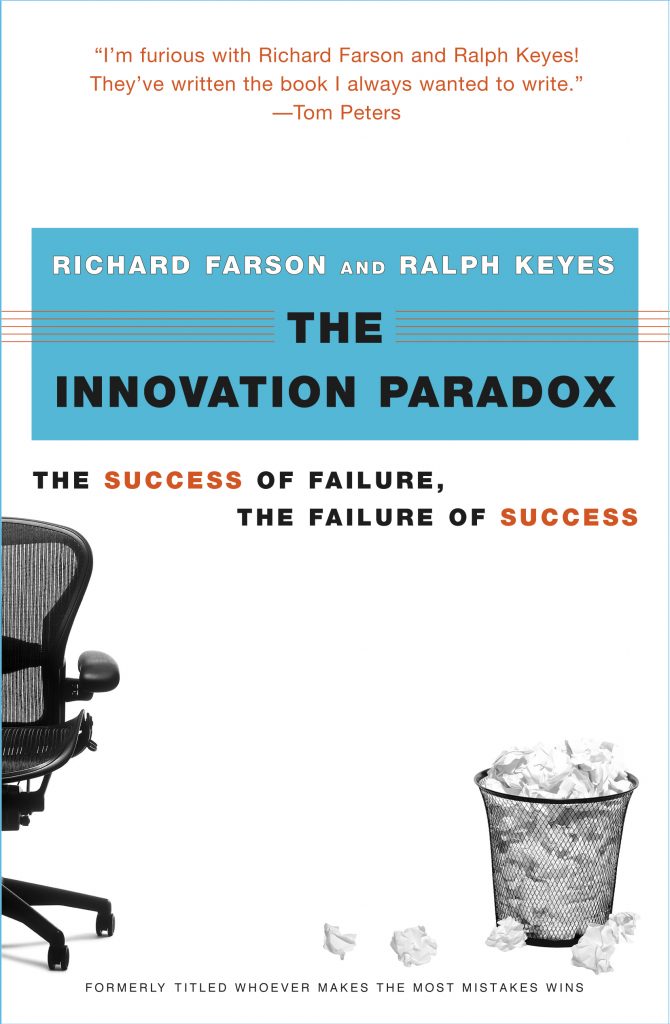Management of the Absurd
Do you wonder why we obsess about categories and labels for things? It goes back to Plato, Aristotle and the birth of Western philosophy. They pioneered ways to use language to understand the world, but there were some unintended consequences.
Richard Farson wrote:
“The great contribution that Eastern philosophies can make to our own thinking is that they have little difficulty embracing the co-existence of opposites. That’s because they were very little influenced by Aristotle. He had the idea that things should be categorized; that if something was true, then it couldn’t be not true. He left that mixed legacy, that unfortunate dichotomy, to us Westerners and we honor it to the present day.”
We’re aware of eastern philosophies like Yin and Yang, how dark and light forces can stay in balance, but we rarely internalize those ideas as deeply as other cultures do. Instead we think the goal is for one force to dominate the other (e.g. good vs. evil), rather that dualism where both forces are needed (day and night).
One of my favorite business authors is Richard Farson, who wrote two books that explore these ideas in the context of work, Management of the Absurd and The Innovation Paradox. As the titles suggest, there are fundamentally strange things about how work works, or doesn’t work, that we tend to to ignore. We struggle to process absurd realities about life and avoid even talking about them. Part of the popularity of Sun Tzu’s The Art of War in the West is it’s paradoxical premise that the best way to win is to never have to fight.
Generally books like these don’t tend to be popular in the U.S. They’re too weird to most people and do not promise easy answers for how to be productive or succeed. And yet it’s these kinds of books that are my favorites. Books that don’t quite fit in a category and don’t promise conventional satisfaction, like Shlain’s Art and Physics or Anne Dillard’s Pilgrim at Tinker Creek. They provide the deepest experiences by capturing what’s puzzling, weird or simply hard to explain, and helping us to hold on to thoughts and feelings over time. These ideas stay with us longer because of their mysteries, because of what’s left unresolved that keeps us curious for years or even a lifetime.
Here are some of my favorite quotes from Management of the Absurd.
‘There is a difference between absurdity and stupidity… Paradox and absurdity keep us off balance. In so doing, they produce the humility, vitality and creative surprise that make life so worth living. But they cannot be controlled. They will always defy the attempt.”
“Some senior managers who have been at the job 30 years don’t necessarily have 30 years of experience. They may have one year of experience thirty times.”
“Technology helps us in countless ways, but it always backfires. The term for this phenomenon in medicine is iatrogenic, meaning “physician induced.” Examples are complications from surgery, side effects of drugs, infections that result from hospital stays. There are more than a thousand different diseases that would not exist if not for the practice of medicine and the existence of hospitals. Half the time any hospital staff is spent treating iatrogenic disease.”
And from the Innovation Paradox:
The price of success too often is a loss of focus and daring. The tendency is to try to protect one’s accomplishments by shifting into cruise control. This syndrome gets played out repeatedly in the television industry. One network climbs to the top, begins to play it safe, repeats what worked in the past, slips behind, then gives may to a competitor on the bottom who’s taking creative chances because it has no reason not to.
According to an old military axiom, the weakest point always follows success. At those times it’s hard to resist the temptation to loosen up, take a breather, and abandon the intense concentration needed to fight your way up the next hill. Once a battle is won, soldiers are liable to ignore the sound of a twig snapping beneath the boot of an approaching scout, or overlook the glow of a distant campfire. Like soldiers, mountaineers say the most dangerous moment of their ascents is after they’ve reached the peak of a mountain. That’s when they’re most likely to fall into a crevasse or slip on a ledge. Surgeons, too, can find it difficult to stay focused once an operation has apparently succeeded. Until then, the demands of operating absorb their attention so completely that the scalpel seems almost to move itself.
Success is at least as hazardous as failure. It means redefining our sense of self around being a success rather than an unfinished portrait (This is a much tougher task that it sounds to those that never had to try.) We also no longer have failure to blame for feeling unhappy. If success can’t make us happy, we then must ask, what can? If we don’t feel successful and our life is problematic, it’s easy to see a connection. Obviously we surmise, the reason we have so many problems is our lack of success.
In the 1950s it was thought that the success of television would lead to radio’s demise. Instead, radio reinvented itself as a talk-show drive-time medium and roared back stronger than ever. Far from wiping out the market for fresh produce, as was feared, frozen vegetables whetted our appetite for fresh ones in countless new varieties. Convenience foods fueled a renaissance in gourmet cooking. Fast food inspired a passion for leisurely dining.



“Some senior managers who have been at the job 30 years don’t necessarily have 30 years of experience. They may have one year of experience thirty times.”
***
I like that one. In a dynamic business, I’d argue that five years of experience may be more valuable than 30 years of nearly identical responsibilities. At Merck, some folks oversaw the same HR process for decades. Needless to say, they couldn’t envision a different and better one. Outsiders did and often didn’t last that long when they challenged the status quo.